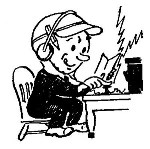Mic fright is a general term for anxiety leading to freezing, choking or hesitating when speaking into a microphone (mic). The physiological response of worrying about saying the right thing to an audience large or small is very natural and expected.

Mic fright or shyness is a reality in public speaking, stage performance and similar situations. Of course, it’s an important topic to new amateur radio operators so let’s provide some perspective and encouragement here.
Making that first voice contact over the radio can be an anxious moment for many new hams. This can also carry over into the first several radio contacts where you worry about saying the right thing and following the rules.
First off, don’t let the “rules” make you nervous. It mainly comes down to proper identification which means giving your call sign every 10 minutes during an exchange and at the end of your last transmission (USA rules, other countries vary). That’s pretty easy to remember.
Second, every ham was a newbie once and remembers what it was like not knowing exactly what they were doing. Most will be patient and helpful, giving coaching and gentle reminders along the way as needed.
For general phone (voice) contacts, there are no real procedures and formalities to worry about; it’s more conversational, much like a phone call. While radio amateurs often use jargon, abbreviation and technical terms (see our Ham-Speak topic), this is not mandatory. Hopefully that takes some of the pressure off to make you more relaxed for your first few contacts.
A starting point for getting on the air the first time is to listen in on the local (VHF/UHF) repeaters and HF SSB bands for a few hours to learn what people say and how they say it. If you follow these examples you are almost certain to be successful when transmitting on your radio.
An excellent way to get past mic fright and performance anxiety is to ease into it with Continue reading

